
(Most recent first. Click on the titles for fuller descriptions).
24th November 2015
On this occasion our speaker was a guest, Ian Bright, who was introduced by club member John Bentley. Before his retirement, Ian had been in business in Sheffield and in his talk he gave a brief history of the development of the steel and cutlery industry in that city. He explained that it was the combined factors of the existence of coal and iron ore, together with the availability of wind and water power that lay behind the establishment of steel-making there in the thirteenth century. In 1624 the Cutlers Company was founded and since then has sought to maintain the standards and quality of Sheffield manufactured cutlery and to promote the name of Sheffield. To illustrate his talk, Ian brought several examples of Sheffield cutlery and associated silverware, much of it lavishly ornamented and all of the highest quality.
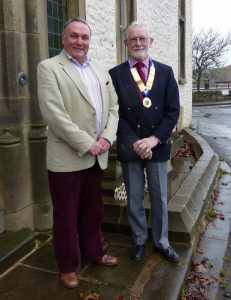
Ian Bright and Alan Grant
10th November 2015
This was an absorbing talk by club member Alberto Hinrichsen who had grown up in Chile in an extensive family whose European forebears had arrived during the mid-nineteenth century and settled in the area of Concepcion. Having sketched out his family background, Alberto went on to describe the political and social changes that had occurred in his native country since the 1920s, starting with the socialist-leaning bourgeois populism that lasted until the rise of fascism in the 1930s. Then, in response to this new threat, there developed in Chile – as also in France and Spain at this time – movements which based their policies on the communist principles of state involvement in the country’s economy.
Later, in the 1960s, events in other parts of the world, such as the Cuban Revolution, the American Civil Rights movement and even the wave of student protest in Europe in 1968, together with the influence of liberation theology all had an effect on Chile’s domestic politics, which underwent radical reform during the period when Allende was in power in the early 1970s until, in 1973, he was ousted by the military coup led by the notorious General Pinochet. (At this dramatic point of his narrative, Alberto ran out of time but he promised to complete his story at a future date).
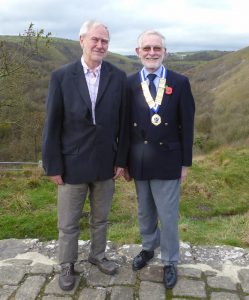
Alberto Hinrichsen and Alan Grant
27th October 2015
An anaesthetist during his professional life, club member John Gibson gave an informative and entertaining talk about the history and development of the use of anaesthetics in medicine. In medieval times the methods by which patients requiring surgery were rendered unconscious were crude in the extreme and included the use of herbal potions, alcohol and even knock-out blows to the head. However, in the 18th Century, with the discovery of nitrous oxide by Joseph Priestley and its anaesthetising properties by Humphry Davy, a more scientific approach began to evolve. Further advances in the following century saw the introduction of substances such as ether and chloroform. These were used for surgery and also, when administered during childbirth, greatly reduced the amount of pain suffered by the mother.
Today’s anaesthetics are vastly more developed such that they fulfil three main functions during surgery. These are: to provide pain relief, to act as a muscle-relaxant and to ensure unconsciousness. John concluded his talk by describing the lengthy and intensive process whereby anaesthetists receive their training.
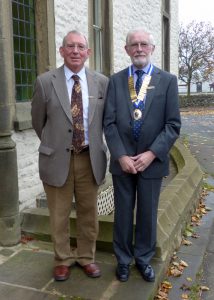
John Gibson and Alan Grant
13th October 2015
This was a talk to give assurance to anyone worried about flying long haul on a twin engine aircraft. Our speaker, club member Brian Holland, demonstrated how the reliability of such airliners has vastly improved to the extent that the most recent types (e.g. Boeing 787 ‘Dreamliner’ and Airbus A350WB) are capable of flying for more than five hours on a single engine in the event of an in-flight failure of the other engine. In his talk, Brian described the development of commercial passenger aircraft from the pioneering days of the last century, through the era of ever-larger piston engines into the turbo-jet age. In particular, he explained how aviation regulations had originally limited twin engine planes to routes on which they were within 60 minutes of a diversion airport. However, with the development of increasingly reliable engines and enhanced operational procedures these regulations have allowed the 60-minute rule to be extended in stages to the current levels.
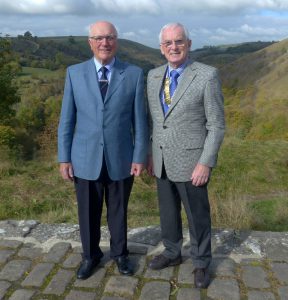
Brian Holland and John Barkley
22nd September 2015
Having run out of time on the previous occasion when he came to talk to the club, guest speaker Andy Pollock returned to complete his story of the Cromford and High Peak Railway. Few people can know as much about this pioneering railway as Andy whose entertaining talk was greatly enhanced by his extensive collection of photographs taken throughout the lifetime of this line. In his talk, he described the railway’s route from Cromford to Whaley Bridge over the limestone plateau of the Peak District. This alignment involved climbing several hundred feet up to the high ground from each end of the line; a problem that was overcome by the use of steeply-graded inclined planes up which wagons (and occasionally locomotives) were hauled by ropes driven by stationary winding engines. Altogether this was a remarkable railway, being one of the earliest built and surviving for over 120 years.
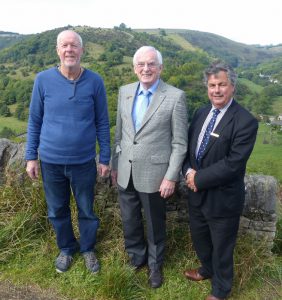
Andy Pollock, John Barkley and David Grattidge
8th September 2015
In this talk Professor Richard Jones, who is the son of club member Robbie, described how Sheffield University, working with industry partners such as Rolls Royce and Boeing, has created a new Advanced Manufacturing Research Centre (AMRC) with the aim of revitalising high value manufacturing in Sheffield and elsewhere. Working directly with industry, the Centre develops new materials, new processes and new products to improve the productivity and competitiveness of UK manufacturing in high value sectors such as aerospace, nuclear and medical technology. In addition, the AMRC offers high quality engineering apprenticeships, with a clear pathway for able young people to progress to an Engineering degree from Sheffield University and beyond.
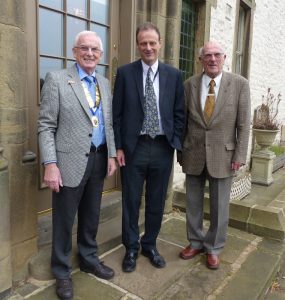
John Barkley, Richard Jones and Robbie Jones
25th August 2015
On leaving school with a total of three ‘O’-level passes, club member Ray Smith received a report from his headmaster which was less than complimentary about Ray’s academic abilities. Clearly, this failed to dampen his spirits because, as he related in his talk, he then joined the RAF and, for several years, pursued a successful career within the Service, firstly as a radio fitter and later as an aircrew navigator. Finally he was involved in air-to-air refuelling operations. Ray’s entertaining narrative about his experiences in the RAF was interspersed with stories about a succession of cars which he had owned, several of which seem to have come to an untimely end in a variety of accidents and incidents.
Taking advantage of favourable conditions available to Commissioned Officers when the time came for him to leave the Service, he then trained to be a solicitor; a profession which he followed for the rest of his working life.
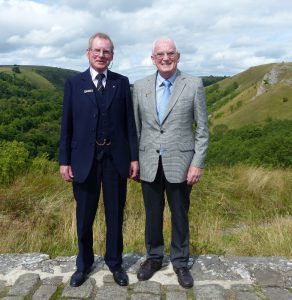
Ray Smith and John Barkley
11th August 2015
Returning to the theme of a talk which he had given last year, club member Andrew Lloyd related more stories of his experiences as an export agent for specialist steel products manufactured in the Sheffield area and the West Midlands. Using the skills acquired during his university degree course in foreign languages and later from a time in banking, he was well equipped to join, and subsequently take over, the firm set up by his father in the late 1960s. In his wide-ranging talk, Andrew described the sort of products handled by his company and the markets in which he had operated.
His enthusiasm for his work is demonstrated by the fact that, although having retired from the business in 2009, he re-commenced work – albeit on a smaller scale – the following year.
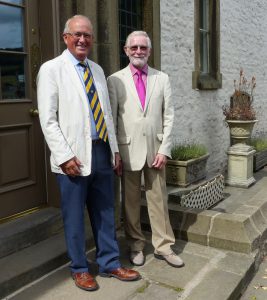
Andrew Lloyd and Alan Grant
28th July 2015
This was an absorbing, thought-provoking and humbling first-hand account of the fall of Calais in May 1940 given by club member, Colonel Leslie Wright who had been involved in the fighting throughout the siege and, injured and wrapped only in a blanket, succeeded in being picked up by a British boat to escape capture by the Germans as the city was overwhelmed by them. Starting his talk by quoting General Sherman’s assertion, ‘War is Hell’, Colonel Wright proceeded to demonstrate the truth of this by describing his own experience of the fighting, confusion, constant bombardment and the ever-present danger of suffering injury or death.
For his audience, the majority of whom were – even as pensioners themselves – too young to have had any personal experience of war, this was an occasion to reflect upon and be thankful for the efforts and the sacrifices made by Colonel Wright and his companions.
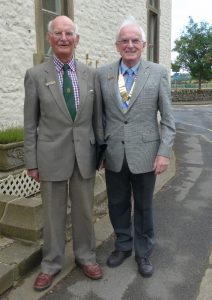
Colonel Leslie Wright and John Barkley
14th July 2015
On this occasion our speaker was a guest, Mandy Coates, assisted by her husband Stephen. Her subject was Haddon Hall, with particular reference to the two families, Vernon and Manners, most closely associated with the property through most of its long history of almost one thousand years. In the early 18th Century Haddon’s owner was newly created as The Duke of Rutland and he and his family, deeming Haddon to be not sufficiently grand as a main residence for them, abandoned Haddon in favour of Belvoir Castle, and Haddon spent the following two hundred years in an almost unchanged and neglected state. Through the efforts of the 9th Duke at the start of the 20th Century the building was restored to its former glory, as can be seen today.
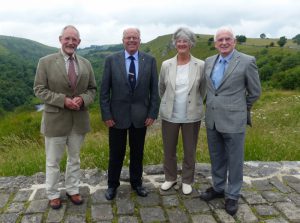
Stephen Coates, Alan Elsmore, Mandy Coates and John Barkley
23rd June 2015
For this talk, club member John Winkworth-Smith recounted the events leading up to one of the largest enquiries conducted by the South Yorkshire police at the time (1985) of the infamous ‘Kelsey Case’. This was a story of deception, fraud and corruption perpetrated by one man in particular, Bill Kelsey, whose criminal activities had funded a lavish lifestyle and which involved arson, bribery and even a mock marriage to one his mistresses. Others drawn in to this case included corrupt police detectives and many of Kelsey’s associates in the Sheffield steel industry. As a result of a two-year police enquiry and the subsequent trial, Kelsey was found guilty of twenty-five offences and sentenced to 7½ years in jail.
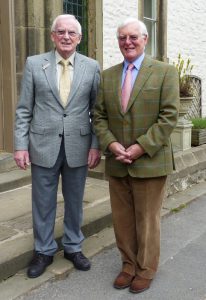
John Barkley and John Winkworth-Smith
9th June 2015
Our guest speaker, Sally Mosley, is a well-known columnist for our local newspaper, the Peak Advertiser, which has now completed 30 years of publication. To mark this anniversary, she undertook a series of walks totalling 30 miles through the Peak District. In her talk today Sally described, with the help of her own photographs, one of these walks which, starting and finishing in Bakewell, encompassed several of the local villages en route. This was more than simply a photographic tour but included many interesting snippets of information on the way.
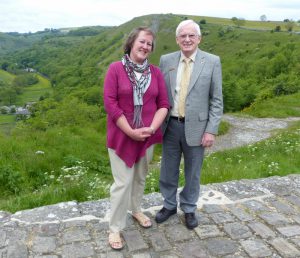
Sally Mosely and John Barkley
26th May 2015
With the help of a wide selection of photographs and diagrams, guest speaker David Shaw, who had been intimately involved in the project, talked extremely knowledgably about the complexities of constructing an immersed tube tunnel to carry the A55 North Wales Coast Road beneath the estuary of the River Conwy. Completed in the early 1990s, this was the first such tunnel to be built in the UK.
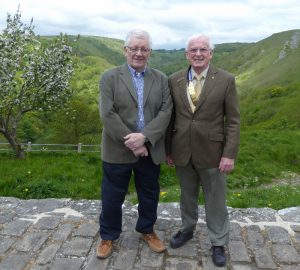
David Shaw and John Barkley
12th May 2015
Club member, Brian Fearn, gave a wonderfully illustrated talk about the time when he and his navigator took part in the 2nd Monte Carlo Winter Challenge. In Brian’s 1937 Aston Martin 2-litre Sports, they started out from Edinburgh Castle on the 18th February 1991 and covered 1,830 miles over 5 days, experiencing the worst winter weather for 25 years, with snow-covered roads for the first 1,000 miles. Brian drove all the way, managing only 15½ hours of sleep over the whole five days. Despite the appalling conditions, 90 of the 120 competitors, including Brian, completed the Rally.
28th April 2015
A man of many interests and several different careers, our club member Ian Johnston, gave a thought-provoking talk in which he considered a range of subjects which were significant to him in terms of their number and/or size, being either very large or very small. For example, he talked about the enormity of the cosmos, the complexity of the human brain with its 30,000 billion neural connections, the atomic structure of metals and, topically, the alarming scale of the British National Debt and Deficit.
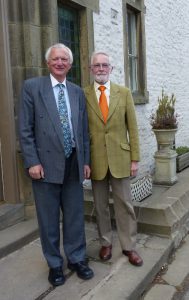
Ian Johnston and Alan Grant
14th April 2015
As one who has spent his whole professional life talking to groups of people – first in education and later as a priest – our own Robbie Jones was sure to give us an accomplished talk; and so it proved. He started by explaining that the title of his talk was a reflection of his own experience which, thanks to the nature of his career, had been one of frequent and numerous house moves, making him into something of professional gypsy. In telling his story – in a wonderfully humorous and entertaining way – he included examples of the music and poetry which have held especial significance for him.
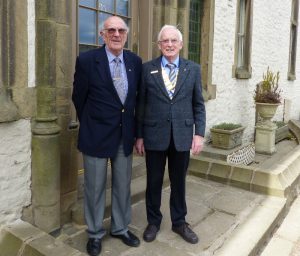
Robbie Jones and John Barkley
10th March 2015
The proposition for this year’s debate was ‘This House believes that the UK should be a Federation’. It was proposed by club member Malcolm Young and opposed by club member Brian Holland. After a lively debate which included contributions from the floor, many of which raised concerns that a federal United Kingdom would almost inevitably result in yet another tier of government, the proposition was put to the vote, where it was defeated. There were nine votes in favour but sixteen against (with six abstentions).
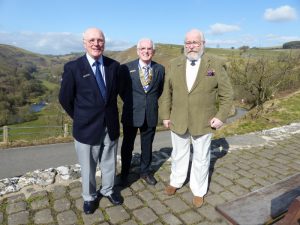
Brian Holland, John Barkley and Malcolm Young
24th February 2015
Having been conscripted as a teenager into the German army in the mid-1940s and subsequently taken Prisoner of War by the Allies, club member Theo Dengel gave a first-hand account of his experiences during the time of his imprisonment. His talk was in the form of a synopsis of the recently published book ‘Hitler’s Last Army’ by Robin Quinn, to which he and many other ex-PoWs had contributed. We learned that the treatment of the German PoWs by the Allies was often at variance from the spirit, and at times even the letter, of the 1929 Geneva Convention. Very much as a result of this unsatisfactory state of affairs, the Convention was updated in 1949.
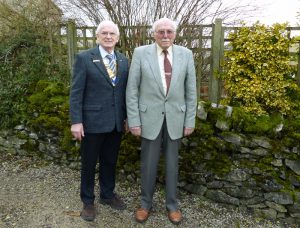
John Barkley and Theo Dengel
10th February 2015
Our guest speaker was George Curley who, among many other accomplishments had served as a J.P. for 32 years. The underlying theme of his amusing and highly entertaining talk was that ‘you never know what’s around the next corner’, and he gave us several examples of events that had had unexpected consequences during his life.
27th January 2015
This was an exceptionally interesting and informative talk presented by guest speaker Dr Nigel Bax, Professor of Medical Education at the University of Sheffield. In his wide-ranging illustrated presentation he described how medical science, whose origins date back to Mesopotamia more than 4,000 years ago, has developed to the present day. He explained that too many doctors are currently being trained, whereas the greater need is actually for general health workers (nurses, &c.) who are more effective in dealing with the problems of poor health caused by social deprivation. The role of doctors is to take responsibility for making difficult decisions and applying sound judgment in support of other health workers.
Dr Bax concluded by discussing the requirements for selecting candidates suitable for training as doctors, of which one of the most important is an ability to communicate with others.
13th January 2015
Club member, Clifford Mansfield has a great interest in, and knowledge of, the life and times of Lord Nelson and his contemporaries. On this occasion, he talked on two subjects; the first being the remarkable story of how a coffin came to be made from a mast of a captured French warship and was given to Nelson for his eventual use (as it happened, some six years later at the Battle of Trafalgar). In the second of Clifford’s talks he related how a naval dirk had come into his possession and he described how he had researched its history.

© Bakewell and District Probus Club, 2014-2024